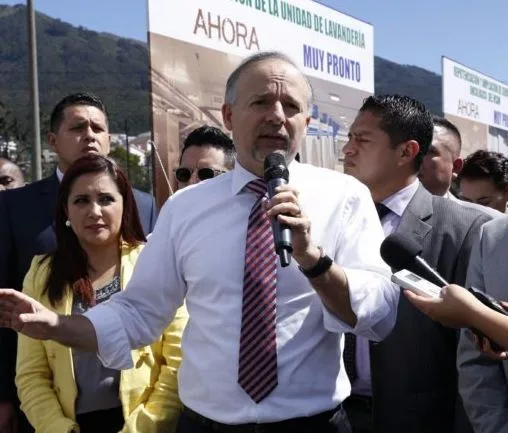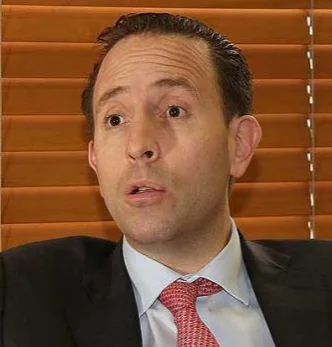IESS system faces financial crisis; Business and labor groups demand investigation
Ecuador’s Social Security Institute (IESS) is in financial trouble and the government is holding emergency meetings in search of solutions.

IESS Richard Espinosa at hospital dedication.
At the heart of the crisis is a debt of almost $3 billion that the federal comptroller says the government owes to the system. Although Ecuador’s finance minister says he is not sure who is responsible for the debt or who will pay it, a cash shortfall is having an immediate impact on IESS pension payments and health care services.
On Wednesday, Labor Minister Raul Ledesma and Finance Minister Carlos de la Torre met to determine how IESS will pay member pensions in the coming months. In a press conference, the two said that the government would a secure a $150 million loan to cover pension payments in the short-term.
Ledesma and de la Torre said the IESS budget problem began in 2010 and got worse in 2015, due to decisions made during the Rafael Correa presidency. “They expanded the program, especially health services, but did not allocate funds to pay for it,” said de la Torre. “Now, our backs are to the wall and we are forced to make difficult decisions under emergency circumstances.”
More concerning than making pension payments is the financial solvency of IESS health care services, where about $2 billion of the debt is owed. According to IESS board of directors president Richard Espinosa, most of the debt is due to costs for providing care to elderly and chronically ill members of the system, as well as for the expansion of services to children of members and “voluntary” members, such as housewives and foreign residents.
Espinosa angered labor and business groups Tuesday when he suggested employers and employees would have to pay a large share of the debt. “It is fair that those who use the health services pay to cover the costs,” he said. “This is not a charity operation.”

Patricio Alarcón
Patricio Alarcón, president of the Quito Chamber of Commerce fired back, asking why businesses and workers should pay for the government’s mistakes. “Affiliates and employers do not owe the IESS anything beyond what they currently pay; they did not create the problem and it’s up to government to fix its own mess.”
Alarcón and other business leaders called for an investigation of the the entire social security institute system, its management under Espinosa and decisions made during the Correa presidency. “They made mistakes that threaten the public trust of the people of Ecuador and it’s important to determine exactly what happened,” he said.
A 2015 decree by Correa is drawing particular ire from business and labor. In it, Correa said social security system members with catastrophic and chronic diseases should be sent to the public health system for treatment. IESS members say that since they pay into the system, they should receive treatment at its facilities, claiming the public health system, which is separate from IESS, offers inferior care.
Alarcón complains that the presidential decree was not funded. “What Correa did was kick the can down the road, since he didn’t want to cover high-cost medical care,” he said. “Almost one billion of the debt is for chronic and catastrophic care and the government didn’t offer to pay a penny more to the Ministry of Health to cover these sick people.”
On Thursday, Espinosa appeared to back off the suggestion that employers and workers pay the debt. At the dedication of a new IESS hospital in Quito, he admitted that the government was responsible for the entire $3 billion shortfall. Ironically, earlier this year Espinosa had insisted that the government owed nothing to IESS, echoing Correa’s position.
According to de la Torre and Alarcón, it seems almost inevitable that major changes are coming to the social security system, especially its medical services. “We can be almost certain that there will be reductions in services and eligibility, and probably increases in fees,” he says. “They have to conduct some realistic long-range planning since this was not done during the previous administration.”




















